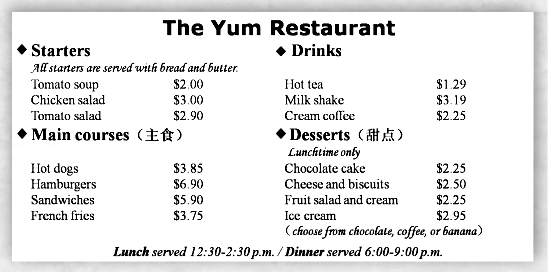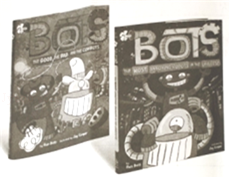BEING an astronaut sounds cool, doesn't it? In space, they get to do some pretty amazing things, like floating in zero gravity(重力).
However, there are also plenty of things that astronauts can't do because of their weightless environment, and that's very sad. What's worse, they can't even let their sadness show, because it's impossible to cry in zero gravity.
Of course, astronauts can still produce tears. But crying is much more difficult in space, according to The Atlantic(大西洋月刊) in January. Without gravity, tears don't flow(流动) down out of the eyes like they do here on Earth. This means that when you cry in space, your tears have nowhere to go-they just stick(粘) to your eyes.
In May 2011, astronaut Andrew Feustel experienced this during one of his spacewalks. "Tears," he said, "don't fall off of your eyes...They just kind of stay there."
Besides making your vision(视线)unclear, this can also cause physical pain. Back on Earth, tears are supposed to bring comfort to the eyes. But that's not the case in space. The space environment dries out astronauts' eyes, and when tears suddenly wet the eyes, it can cause pain rather than comfort. "My right eye is stinging(刺痛) like crazy," Feustel told his teammate during the walk.
Since gravity doesn't work in space, astronauts need some extra help to get rid of(除去) the tears. Feustel chose to rub his eyes against his helmet to wipe(擦) the tears away. Another choice is to just wait-"When the tears get big enough they simply break free of the eyes and float around," astronaut Ron Parise told The Atlantic.
There are lots of small things-things like crying-that we are so used to on Earth. We usually take them for granted until they become a problem in a totally different environment, like space. There, astronauts can't talk to each other directly. They also can't eat or drink in normal ways. They can't even burp (打嗝), because there is no gravity to hold the food down in their stomach. If they do burp, they just end up throwing up(呕吐)everything in their stomach, according to the UK National Space Center.
Therefore, perhaps it's only space explorers who can honestly say: "Gravity, you're the best."From Paragraphs 2 and 3 , we can know that_______.
| A.astronauts are unable to feel sad in space |
| B.astronauts produce fewer tears in space |
| C.tears produced in space flow down more slowly |
| D.tears produced in space don't flow downward |
What effect do tears have on astronauts?
| A.They cause physical pain. |
| B.They bring comfort to them. |
| C.They make their vision clearer. |
| D.They float around and cause trouble. |
The underlined phrase "take them for granted" in paragraph 7 means _______.
| A.find them important |
| B.consider them useless |
| C.need them during an emergency |
| D.fail to notice their presence(存在) |
The second-to-last paragraph (paragraph 7) is mainly about_______.
| A.suggestions of how astronauts can stay comfortable in space |
| B.other basic things that are difficult to do in space |
| C.why burping is impossible in space |
| D.things human can't do without gravity |

(1)The Yum Restaurant stays open for in total.
A.two hours
B.three hours
C.five hours
(2)From the menu above, we know that .
A.bread and butter goes with starters
B.there are four kinds of different ice cream
C.the desserts are available for both lunch and dinner
You can make the world a brighter place. How? Here are a few ideas. Which have you tried? Which would you like to try?
You can volunteer.
Clean up litter in a park. Pick up plastic on a beach. Lend a helping hand to a neighbor in need.
You can raise money.
Hold a bake sale. Run a lemonade stand. You can donate the money you earn. It can help a cause you care about.
You can lead a food drive.
Get your friends together. Collect canned food. Ask neighbors to donate too. Bring the canned goods to a food bank in your own.
You can donate.
Do you have clothes that no longer fit? Do you have toys you no longer play with? Give them to a local shelter.
(1)Which have you tried?
(2)Which would you like to try?
(3)Who can make the world a brighter place?
(4)How can you make the world a brighter place?
(5)Which title is better, Ways to Give or Ways to Take?
We all know that healthy food is good for our bodies. But most people don't know it is also good for the mind! What we eat doesn't just affect (影响) the way we look. It also affects the way we think and remember things.
Doctors have said fish like mackerel(马鲛鱼) and salmon (鲑鱼) are good for the brain.These fish have special fats that help children's brain to grow. They also help to keep adults' memories sharp.Some green vegetables are also good for the brain. They have a lot of vitamins (维生素) the brain needs.
But don't think if you eat a lot of salmon, you'll never have to study again! The truth is, these foods don't make you smarter. But they do keep your brain healthy, and a healthy brain is easier to use.
(1)Healthy food is .
A. only good for our bodies
B. only good for the mind
C. not only good for our bodies, but also for the mind
(2)Why is salmon good for children?
A. Because it is from the ocean.
B. Because it helps children to become smarter.
C. Because it has special fats that help children's brain to grow.
(3)What does the underlined word "sharp" mean?
A. good
B. poor
C. bad
(4)What would be the best title for the article?
A. The Best Food﹣ Fish.
B. Feed Your Brain
C. How to Make Your Children Smart.
Anvitha Vgay, 9, can build an app. With the help of You Tube videos, the young techies from Melbourne, Australia, learned to code (编程) at age 7. Soon, she was trying her hand at making apps. "When I first got my iPad, I was fascinated by all the apps on it," she said,"It wasn't long before I wanted to create my own." She built her first two apps with her younger sister in mind. Smartkins Animals helps children identify (识别) more than 100 animals and their sounds. Smartkins Rainbow Colors teaches kids colors. Each app has been downloaded thousands of times.
(1)When did Anvitha begin to learn to make apps?
A. At the age of 7.
B. At the age of 8.
C. At the age of 9.
(2)For whom did Anvitha build her first two apps?
A. For her brother.
B. For her sister.
C. For herself.
(3)What is Smartkins Animals?
A. A toy.
B. An app.
C. An apple.
(4)What does Smartkins Rainbow Colors teach kids?
A. Colors.
B. Animals.
C. Animals' sounds.
Joe Bot and Rob Ot are robots.They are also best friends.The two pals live on a faraway planet.They are characters in a new book series (系列). The books are graphic (绘画) novels.They are written by Russ Bolts and illustrated (插图) by Jay Cooper. The first two Bots books are in stores now.
(1)What is the name of the book series?
A. Joe Bot and Rob Ot
B. Two Robots
C. Bots
(2)Who is the writer of the Bots books?
A. Joe Bot.
B. Russ Bolts.
C. Jay Cooper.
(3)Who are Joe Bot and Rob Ot?
A. They are robots.
B. They are best friends.
C. They are characters in a new book series.
